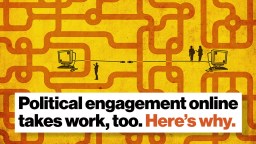The Revolution That Wasn’t: How Digital Activism Favors Conservatives
Jen Schradie: So if someone is thinking about how to build some kind of team to really build and develop an online political or other type of campaign, it's really important to think about who is part of this team. Is it people who understand the audience, right? Do you really know that everyone has internet access or not, or uses a specific platform or not?
And also, does the team really have a really clear division of labor? That is one of the most important pieces that I found. That rather than let's build a Twitter platform -- or presence. Let's build a Facebook presence. Let's use Instagram. And it takes more than just building the platform. It really takes developing it.
And what I found is the architecture of the platform is really important. The groups that tended to have the highest levels of participation really built them for participation, which I know sounds kind of silly. But Facebook in particular, but other platforms have different ways that you can actually set up their platforms to either encourage other people to post or to really restrict that.
And I think to really understand how those platforms work, it takes someone dedicated to understand the next platform that we don't even know exists now, and is able to spend time learning and training. And the problem is that groups that have very little resources where they just rely on volunteers who are also doing a million other things, simply can't keep up with all these changes.
I talked to one activist who had gone to a training on how to build a website and to update their website. They had a website. But then six months later, because they weren't doing it on a regular basis, because this organizer had multiple other tasks to do, wasn't really able to remember six months later how to engage.
So really to have a strong online presence, it does take expertise. And expertise doesn't necessarily mean throwing the online engagement to a young intern. In fact, I think that's something that is an assumption that is not always valid, that young people automatically just know how to use social media.
In fact, I was very interested in finding that it was sometimes older Tea Party activists, sometimes in their 70s, who were the most digitally savvy. So not only did they spend a lot of time online, but they also went to trainings. And this is where having resources do really matter. Yes, there is free information online, et cetera.
But what I really found was that however grassroots a lot of these conservative groups were, they did have connections to very resource-rich organizations that provided consistent training in how to use digital media. And not only the training and how to use it, but they also were given and sent a lot of posts and memes, and et cetera, that really worked for the political message that these groups were trying to make.





